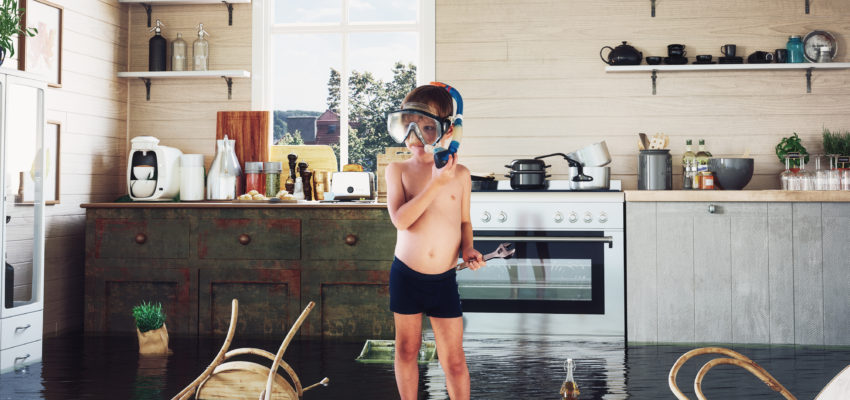Is Your Home Protected from Water Damage?

Spring in New England brings nicer weather and longer days, but warmer temperatures can also mean melting snow, thawing ice, and rainstorms — all of which can potentially cause water damage to your home. How do you know if your home is protected from water damage, and does insurance cover it?
Most homeowners insurance policies typically help cover water damage if the cause is sudden and accidental – like a burst pipe or a dishwasher hose burst. However, flooding is a separate issue, and a separate flood insurance policy is needed to cover that loss. You don’t have to live near a body of water to be at risk for flooding—it can happen anywhere it rains. And since a standard homeowner’s policy typically does not cover flooding—we recommend that everyone take a look at flood insurance.
One of the best things you can do to safeguard your home from water damage is to take preventive measures and properly maintain your home to minimize damage from water disasters. Here are our best tips to keep your home watertight.
Keep your home’s exterior protected and make repairs when needed.
- After a long winter of snowfall and freezing temperatures, it’s a good idea to inspect your roof for missing or damaged shingles and make necessary repairs. You should also caulk and seal windows to guard against water seepage or hire a pro to help.
- Clean your gutters frequently, and consider installing gutter guards to prevent clogs and keep water flowing away from the house. Check downspouts and remove any debris that may have accumulated.
- Check sprinklers and irrigation systems to be sure they are not damaging the walls of your house, and be sure to drain outside faucets to keep pipes from freezing.
Prevent water from seeping into your basement.
- Since water in the basement is often caused by cracks in building foundations or floor slabs, reseal your basement when needed. Cement floors and the walls of your basement can deteriorate over time, which means water can seep in after a heavy rainfall.
- Make sure water drains away from your house. Rainwater that flows towards your home may go down the outside of the foundation wall and can then leak through any cracks.
Maintain your indoor plumbing systems and your home’s interior.
- Every year, you should inspect the hoses leading to all your appliances: water heaters, dishwashers, icemakers, and washing machines. Replace any hoses that have cracks or leaks.
- Maintain your sump pump and make sure it’s operating correctly. You should get it inspected and tested at least once a year, and you may need to replace it if it is ten years old or more.
- Check the seal and caulking around showers and tubs regularly to ensure they are watertight, and reseal if necessary.
- Know where the main water shut-off valve in your home is located in case you need to shut it off quickly in an emergency. You should also consider installing an emergency pressure release valve in your plumbing system.
- As a general rule of thumb, you should plan to check your water heater every two months to avoid serious issues such as leaks, pipe bursts, and other large plumbing problems. And have it professionally serviced once a year.
Safeguard your possessions.
- Store any off-season items, such as seasonal clothing, in waterproof bins, especially in areas that are prone to dampness or where there are pipes, like your basement. Don’t store valuables where there is risk of destruction from water or mold.
- If you are storing your belongings in the basement, keep them on shelves and off the floor. They’re less likely to get damaged if water enters your basement.
- Maintain a comprehensive list of your possessions. Keeping a home inventory will save you time and stress in case of loss from water damage.
We are here to answer your questions and discuss your insurance options. Contact one of our agents today for a no-obligation review of your home insurance policy. Our goal is to be sure you have the best coverage for you and your loved ones.
Sources:
https://www.iii.org/article/how-protect-your-home-water-damage
https://www.amfam.com/resources/articles/at-home/preventing-water-leaks
